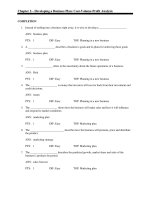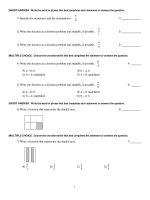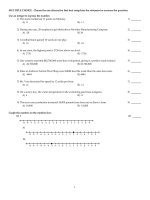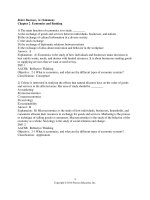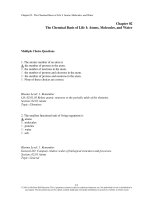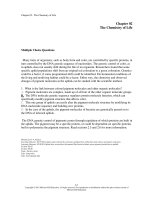Business statistics 3rd edition sharpe test bank
Bạn đang xem bản rút gọn của tài liệu. Xem và tải ngay bản đầy đủ của tài liệu tại đây (275.82 KB, 31 trang )
Chapter 2: Displaying and Describing Categorical Data – Quiz A
Name_____________________________________
A large national retailer of electronics conducted a survey to determine consumer
preferences for various brands of point and shoot digital cameras. The table summarizes
responses by brand and gender.
Cannon Power Shot
Nikon Cool Pix
Sony Cyber Shot
Panasonic Lumix
Fujifilm Finepix
Olympus S/V
Other Brands
Total
Female
73
49
58
35
45
37
86
383
Male
59
47
33
30
28
41
67
305
Total
132
96
91
65
73
78
153
688
2.1.3 Create and use frequency and relative frequency distributions and their displays.
1. Identify the variables and tell whether each is categorical or quantitative.
2.1.3 Create and use frequency and relative frequency distributions and their displays.
2. Find each of the following percentages.
a. What percent of the responses were males who prefer Nikon?
b. What percent of the male responses prefer Olympus?
c. What percent of the consumers who choose Nikon were females?
2.3.4 Determine if displays of data are appropriate.
3. What is the marginal distribution of brands?
2.2.4 Determine if displays of data are appropriate.
4. Prepare an appropriate chart to display the marginal distribution of brands.
2.3.4 Determine if displays of data are appropriate.
5. Write a sentence or two about the conditional relative frequency distribution of the
brands among female respondents.
2-1
Copyright © 2015 Pearson Education, Inc.
2-2 Chapter 2 Displaying and Describing Categorical Data
2.2.1 Determine if displays of data are appropriate.
6. Consider the following side by side bar chart for the data above:
Does the chart indicate that brand preference is independent of gender? Explain.
Copyright © 2015 Pearson Education, Inc.
Quiz A 2-3
Chapter 2: Displaying and Describing Categorical Data – Quiz A – Key
A large national retailer of electronics conducted a survey to determine consumer
preferences for various brands of digital cameras. The table summarizes responses by
brand and gender.
Cannon Power Shot
Nikon Cool Pix
Sony Cyber Shot
Panasonic Lumix
Fujifilm Finepix
Olympus S/V
Other Brands
Total
Female
73
49
58
35
45
37
86
383
Male
59
47
33
30
28
41
67
305
Total
132
96
91
65
73
78
153
688
1. Identify the variables and tell whether each is categorical or quantitative.
Gender and Brand; both categorical.
2. Find each of the following percentages.
a. What percent of the responses were males who prefer Nikon?
6.8% (47/688)
b. What percent of the male responses prefer Olympus?
13.4% (41/305)
c. What percent of the consumers who choose Nikon were females?
51.0% (49/96)
3. What is the marginal distribution of brands?
132 for Cannon Power Shot, 96 for Nikon Cool Pix, 91 for Sony Cyber Shot, 65 for
Panasonic Lumix, 73 for Fujifilm Finepix, 78 for Olympus S/V and 153 for other brands.
4. Prepare an appropriate chart to display the marginal distribution of brands.
Either a bar chart (shown below) or a pie chart is appropriate.
Copyright © 2015 Pearson Education, Inc.
2-4 Chapter 2 Displaying and Describing Categorical Data
5. Write a sentence or two about the conditional relative frequency distribution of the
brands among female respondents.
Among females, 19.1% prefer Cannon, 12.8% prefer Nikon, 15.1% prefer Sony, 9.1%
prefer Panasonic, 11.7% prefer Fujifilm, and 9.7% prefer Olympus. The remaining
22.5% of females preferred other brands.
6. Consider the following side by side bar chart for the data above:
Does the chart indicate that brand preference is independent of gender? Explain.
Brand preference appears to be independent of gender for about half of the brands. The
other half of the brand preferences seem to have preference based on gender. These data
provide little evidence of a difference in digital camera choice based on gender.
Copyright © 2015 Pearson Education, Inc.
Quiz B 2-5
Chapter 2: Displaying and Describing Categorical Data – Quiz B
Name_____________________________________
A full service brokerage firm gathered information on how their clients were investing
for retirement. Based on age, clients were categorized according to where the largest
percentage of their retirement portfolio was invested. The table below summarized the
data.
Age 50 or
Younger
Over
Age 50
Total
Mutual Funds
30
34
64
Stocks
37
45
82
Bonds
19
23
42
Total
86
102
188
2.1.3 Create and use frequency and relative frequency distributions and their displays.
1. Identify the variables and tell whether each is categorical or quantitative.
2.1.3 Create and use frequency and relative frequency distributions and their displays.
2. Find each of the following percentages.
a. What percent of the clients are over age 50 who invests in mutual funds?
b. What percent of clients over age 50 invest in mutual funds?
c. What percent of the mutual fund investors are over age 50?
2.3.4 Determine if displays of data are appropriate.
3. What is the marginal distribution of age?
2.2.4 Determine if displays of data are appropriate.
4. Prepare an appropriate chart to display the marginal distribution of age.
2.1.3 Create and use frequency and relative frequency distributions and their displays.
5. Write a sentence or two about the conditional relative frequency distribution of mode
of investment for clients age 50 or younger.
Copyright © 2015 Pearson Education, Inc.
2-6 Chapter 2 Displaying and Describing Categorical Data
2.4.3 Create and use frequency and relative frequency distributions and their displays.
60
50
Data
40
30
20
10
0
Investment
Younger Older
Mutual Funds
Younger Older
Stocks
Younger Older
Bonds
Percent within levels of Investment.
6. Consider the following side by side bar chart for the data above:
Does the chart indicate that mode of investment is independent of age? Explain.
2.5.4 Create and use frequency and relative frequency distributions and their displays.
7. A newspaper examined the town's two hospitals and found that over the last six
months at Mercy Hospital 79% of the patients survived while at County Hospital 90%
survived. The table below summarizes the findings.
Lived
Died
Total
% who lived
790
210
1000
79.0%
Mercy Hospital
900
100
1000
90.0%
City Hospital
On closer investigation, it was observed that there was a difference in survival between
patients who were admitted in poor condition or worse compared with patients admitted
in fair condition or better. The following tables were created:
Patients admitted in poor condition or worse:
Lived
Died
210
200
Mercy Hospital
40
70
City Hospital
Total
410
110
Copyright © 2015 Pearson Education, Inc.
% who lived
Quiz B 2-7
Patients admitted in fair condition or better:
Lived
Died
Total
% who lived
580
10
590
Mercy Hospital
860
30
890
City Hospital
a) Fill in the four blanks in the two tables above with percentages.
b) Compare the percentages in the first table with those in the next two tables. Do
you observe anything unusual?
c) Which hospital would you choose and why?
Copyright © 2015 Pearson Education, Inc.
2-8 Chapter 2 Displaying and Describing Categorical Data
Chapter 2: Displaying and Describing Categorical Data – Quiz B – Key
A full service brokerage firm gathered information on how their clients were investing
for retirement. Based on age, clients were categorized according to where the largest
percentage of their retirement portfolio was invested. The table below summarized the
data.
Age 50 or
Younger
Over
Age 50
Total
Mutual Funds
30
34
64
Stocks
37
45
82
Bonds
19
23
42
Total
86
102
188
1. Identify the variables and tell whether each is categorical or quantitative.
Mode of investment and age; mode of investment is categorical; age is a quantitative
variable. However, in this case investors are grouped according to age therefore the “age
category” is relevant and this is categorical.
2. Find each of the following percentages.
a. What percent of the clients are over age 50 who invests in mutual funds?
18.1% (34/188)
b. What percent of clients over age 50 invest in mutual funds?
33.3% (34/102)
c. What percent of the mutual fund investors are over age 50?
53.1% (34/64)
3. What is the marginal distribution of age?
86 clients are age 50 or younger and 102 are over age 50.
4. Prepare an appropriate chart to display the marginal distribution of age.
Either a bar chart (shown below) or a pie chart is appropriate.
Copyright © 2015 Pearson Education, Inc.
Quiz B 2-9
Chart of Number of Clients
100
Number of Clients
80
60
40
20
0
50 or Younger
Over 50
Age
5. Write a sentence or two about the conditional relative frequency distribution of mode
of investment for clients age 50 or younger.
More clients (43%) age 50 or younger invested their retirement savings primarily in
stocks rather than in any other mode of investment, 35% invested in mutual funds while
only 22% invested in bonds.
Copyright © 2015 Pearson Education, Inc.
2-10 Chapter 2 Displaying and Describing Categorical Data
6. Consider the following side by side bar chart for the data above:
Chart of Younger, Older
60
50
Data
40
30
20
10
0
Investment
Younger Older
Mutual Funds
Younger Older
Stocks
Younger Older
Bonds
Percent within levels of Investment.
Does the chart indicate that mode of investment is independent of age? Explain.
The way clients invest for retirement does seem to be independent of age. These data
provide little indication of a difference in mode of investing for retirement based on
clients’ ages at this firm.
7. A newspaper examined the town's two hospitals and found that over the last six
months at Mercy Hospital 79% of the patients survived while at County Hospital 90%
survived. The table below summarizes the findings.
Mercy Hospital
City Hospital
Lived
790
900
Died
210
100
Total
1000
1000
% who lived
79.0%
90.0%
On closer investigation, it was observed that there was a difference in survival between
patients who were admitted in poor condition or worse compared with patients admitted
in fair condition or better. The following tables were created:
Patients admitted in poor condition or worse:
Lived
Died
210
200
Mercy Hospital
40
70
City Hospital
Total
410
110
Copyright © 2015 Pearson Education, Inc.
% who lived
51.2%
36.4%
Quiz B 2-11
Patients admitted in fair condition or better:
Lived
Died
580
10
Mercy Hospital
860
30
City Hospital
Total
590
890
% who lived
98.3%
96.6%
a) Fill in the four blanks in the two tables above with percentages.
b) Compare the percentages in the first table with those in the next two tables. Do
you observe anything unusual?
Those who were admitted in fair condition or better have a very high rate of survival.
Mercy Hospital has an over 50% of survival for those admitted in poor condition or
worse whereas in the summary table, Mercy Hospital had a lower rate of survival.
c) Which hospital would you choose and why?
It would be best to choose Mercy Hospital because it has the higher rate of survival for
both conditions of admitted patients.
Copyright © 2015 Pearson Education, Inc.
2-12 Chapter 2 Displaying and Describing Categorical Data
Chapter 2: Displaying and Describing Categorical Data– Quiz C – Multiple Choice
Name_____________________________________
2.1.3 Create and use frequency and relative frequency distributions and their displays.
1. A automobile marketing firm conducts a study to see what types of cars people owned before
buying an American car. The results are shown below.
Previous Ownership
American
Japanese
Korean
German
Other
Total
Frequency
760
375
72
37
24
1268
The relative frequency of those who owned Japanese cars previously who now bought American
cars is
A. 59.9 %
B. 29.6%
C. 5.7%
D. 14.9%
E. 2.9%
2.1.3 Examine and use contingency tables.
2. A large national retailer of electronics conducted a survey to determine consumer preferences
for various brands of digital cameras and the data are summarized in the table shown below.
Cannon Power Shot
Nikon Cool Pix
Sony Cyber Shot
Panasonic Lumix
Fujifilm Finepix
Olympus S/V
Other Brands
Total
Female
73
49
58
35
45
37
86
383
Male
59
47
33
30
28
41
67
305
The percentage of consumers who are male and prefer Fujifilm is
A.
B.
C.
D.
E.
44.3 % (305/688).
10.6% (73/688).
38.4% (28/73).
56.2% (41/73).
4.1% (28/688).
Copyright © 2015 Pearson Education, Inc.
Total
132
96
91
65
73
78
153
688
Quiz C 2-13
2.1.3 Examine and use contingency tables.
3. A large national retailer of electronics conducted a survey to determine consumer preferences
for various brands of digital cameras and the data are summarized in the table shown below.
Cannon Power Shot
Nikon Cool Pix
Sony Cyber Shot
Panasonic Lumix
Fujifilm Finepix
Olympus S/V
Other Brands
Total
Female
73
49
58
35
45
37
86
383
Male
59
47
33
30
28
41
67
305
Total
132
96
91
65
73
78
153
688
Of the consumers who are male, the percentage who prefer Sony is
A.
B.
C.
D.
E.
44.3 % (305/688).
10.8% (33/305).
36.3% (33/91).
4.8% (33/688).
13.2% (91/688).
2.1.3 Examine and use contingency tables.
4. A large national retailer of electronics conducted a survey to determine consumer preferences
for various brands of digital cameras and the data are summarized in the table shown below. Of
the consumers who prefer Olympus, what percentage is female?
Cannon Power Shot
Nikon Cool Pix
Sony Cyber Shot
Panasonic Lumix
Fujifilm Finepix
Olympus S/V
Other Brands
Total
A.
B.
C.
D.
E.
Female
73
49
58
35
45
37
86
383
Male
59
47
33
30
28
41
67
305
47.4 % (37/78).
6.0% (41/688).
52.6% (41/78).
11.7% (45/383).
11.3% (78/688).
Copyright © 2015 Pearson Education, Inc.
Total
132
96
91
65
73
78
153
688
2-14 Chapter 2 Displaying and Describing Categorical Data
2.2.3 Create and use frequency and relative frequency distributions and their displays.
5. Based on the side-by-side bar chart summarizing consumer preferences for various brands of
digital cameras by gender, which of the following statement(s) are true?
A. It appears that camera preference and gender are at least somewhat related.
B. If Other Brands are ignored, it appears that camera preference and gender are independent.
C. If Other Brands are ignored, it is not obvious that camera preference and gender are
independent.
D. More males than females prefer Cannon.
E. More females than males prefer Sony.
2.2.3 Create and use frequency and relative frequency distributions and their displays.
6. The following is a bar chart summarizing consumer preferences for various brands of digital
cameras.
Copyright © 2015 Pearson Education, Inc.
Quiz C 2-15
This bar chart shows
A.
B.
C.
D.
E.
the marginal distribution of brands.
the conditional distribution of brands.
the contingency distribution of brands.
the distribution for a quantitative variable.
none of the above.
2.1.4 Find conditional and marginal distributions and make comparisons.
7. A company interested in the health of its employees started a health program including
monitoring blood pressure. Based on age, employees were categorized according to ranges of
blood pressure by age intervals. Data are shown in the table below.
BP
Low
Normal
High
Total
Under 30
27
48
23
98
Age
30-49
38
90
59
187
Over 50
31
92
72
195
Total
96
230
154
480
The percentage of employees who are over age 50 and have high blood pressure is
A.
B.
C.
D.
E.
46.8% (72/154).
32.1% (154/480).
31.6% (59/187).
36.9% (72/195).
15.0% (72/480).
2.1.4 Find conditional and marginal distributions and make comparisons.
8. A company interested in the health of its employees started a health program including
monitoring blood pressure. Based on age, employees were categorized according to ranges of
blood pressure by age intervals. Data are shown in the table below.
Age
BP
Under 30
30-49
Over 50
Total
27
38
31
96
Low
48
90
92
230
Normal
23
59
72
154
High
98
187
195
480
Total
Of all employees, the percentage who are over 50 and have high blood pressure is
A.
B.
C.
D.
E.
46.8% (72/154).
15.0% (72/480).
31.6% (59/187).
36.9% (72/195).
47.2% (92/195).
Copyright © 2015 Pearson Education, Inc.
2-16 Chapter 2 Displaying and Describing Categorical Data
2.1.4 Find conditional and marginal distributions and make comparisons.
9. A company interested in the health of its employees started a health program including
monitoring blood pressure. Based on age, employees were categorized according to ranges of
blood pressure by age intervals. Data are shown in the table below.
BP
Low
Normal
High
Total
Under 30
27
48
23
98
Age
30-49
38
90
59
187
Over 50
31
92
72
195
Total
96
230
154
480
Of all employees, the percentage of those under 50 years old is
A.
B.
C.
D.
E.
17.1% (82/480).
40.6% (195/480).
13.5% (65/480).
36.9% (72/195).
49.4% (285/480).
2.1.4 Find conditional and marginal distributions and make comparisons.
10. A company interested in the health of its employees started a health program including
monitoring blood pressure. Based on age, employees were categorized according to ranges of
blood pressure by age intervals. Data are shown in the table below. .
Age
BP
Under 30
30-49
Over 50
27
38
31
Low
48
90
92
Normal
23
59
72
High
98
187
195
Total
The percentage of employees with normal or low blood pressure is
A.
B.
C.
D.
E.
67.9% (326/480).
47.9% (230/480).
41.7% (96/230).
80.0% (384/480).
20.0% (96/480).
Copyright © 2015 Pearson Education, Inc.
Total
96
230
154
480
Quiz C 2-17
2.2.3 Create and use frequency and relative frequency distributions and their displays.
11. Here is a stacked bar chart for data collected about employee blood pressure.
This chart shows
A. the distribution of a quantitative variable.
B. the contingency distribution of blood pressure type.
C. the conditional distribution of blood pressure type.
D. the marginal distribution of blood pressure type.
E. the joint distribution of blood pressure type.
2.5.4 Create and use frequency and relative frequency distributions and their displays.
12. A consulting firm examined the profit of two grocery stores and found that over the last year
at Grocery Store A 66.7% of the months showed profit while at Grocery Store B 83.3% showed
profit. The table below summarizes the findings.
Grocery A
Grocery B
Months
Profit
8
10
Months Loss
Total
% months profit
4
2
12
12
66.7%
83.3%
On closer investigation, it was observed that there was a difference in profit between stores that
served wealthier neighborhoods versus less wealthy. The following tables were created:
Grocery stores serving wealthy neighborhoods:
Months
Months Loss
Profit
5
3
Grocery A
5
2
Grocery B
Total
% months profit
8
10
62.5%
50.0%
Copyright © 2015 Pearson Education, Inc.
2-18 Chapter 2 Displaying and Describing Categorical Data
Grocery stores serving less wealthy neighborhoods:
Months
Months Loss
Profit
2
2
Grocery A
1
1
Grocery B
Total
% months profit
4
2
50.0%
50.0%
What can be assumed about the profit of grocery stores?
A. Grocery Store B has more consistent profit overall.
B. It is clear that less wealthy neighborhoods will not yield these grocery store profits.
C. It is unclear how to predict the profit of these grocery stores based on the wealth of
neighborhoods.
D. Grocery Store A showed less profit overall but showed greater profit in wealthier
neighborhoods.
E. There is no difference in profit overall with grocery stores in either wealthier versus less
wealthy neighborhoods.
Copyright © 2015 Pearson Education, Inc.
Quiz C 2-19
Chapter 2: Displaying and Describing Categorical Data – Quiz C – Key
1. B
2. E
3. B
4. A
5. A,C,E
6. A
7. D
8. B
9. E
10. A
11. C
12. D
Copyright © 2015 Pearson Education, Inc.
2-20 Chapter 2 Displaying and Describing Categorical Data
Chapter 2: Displaying and Describing Categorical Data– Quiz D – Multiple Choice
Name_____________________________________
2.1.3 Create and use frequency and relative frequency distributions and their displays.
1. A restaurant uses comment cards to get feedback from its customers about newly
added items to the menu. It recently introduced homemade organic veggie burgers.
Customers who tried the new burger were asked if they would order it again. The data
are summarized in the table below. What percentage of customers would definitely order
the veggie burger again?
Response
Definitely would.
Most likely would.
Maybe
Definitely would not.
A.
B.
C.
D.
E.
Frequency
10
40
12
3
10%
15%
20%
40%
77%
2.1.3 Create and use frequency and relative frequency distributions and their displays.
2. A restaurant uses comment cards to get feedback from its customers about newly
added items to the menu. It recently introduced homemade organic veggie burgers.
Customers who tried the new burger were asked if they would order it again. The data
are summarized in the table below. What percentage of customers would most likely or
definitely order the veggie burger again?
Response
Definitely would.
Most likely would.
Maybe
Definitely would not.
A.
B.
C.
D.
E.
Frequency
10
40
12
3
10%
15%
40%
50%
77%
Copyright © 2015 Pearson Education, Inc.
Quiz D 2-21
2.2.1 Determine if displays of data are appropriate.
3. A restaurant uses comment cards to get feedback from its customers about newly
added items to the menu. It recently introduced homemade organic veggie burgers.
Customers who tried the new burger were asked if they would order it again. Which of
the following would be an appropriate method for displaying the data shown in the table?
Response
Definitely would.
Most likely would.
Maybe
Definitely would not.
A.
B.
C.
D.
E.
Frequency
10
40
12
3
Contingency table.
Segmented bar chart.
Pie chart.
Both A and B.
Both B and C.
2.2.1 Determine if displays of data are appropriate.
4. In May, 2010, the Pew Research Center for the People & the Press carried out a
national survey to gauge opinion on the Arizona Immigration Law. Responses (Favor,
Oppose, Don’t Know) were examined according to groups defined by political party
affiliation (Democrat, Republican, Independent). Which of the following would be
appropriate for displaying these data?
A.
B.
C.
D.
E.
Contingency table.
Pie charts.
Segmented bar chart.
Side by side bar chart.
All of the above.
2.1.3 Examine and use contingency tables.
5. A regional survey was carried out to gauge public opinion on the controversial
Arizona Immigration Law (results shown below). How many respondents are
Republican and favor the law?
Response
Favor
Oppose
Don't Know
A.
B.
C.
D.
E.
Democrat
50
85
5
Republican
93
45
7
93
45
145
7
85
Copyright © 2015 Pearson Education, Inc.
Independent
35
60
20
2-22 Chapter 2 Displaying and Describing Categorical Data
2.2.3 Create and use frequency and relative frequency distributions and their displays.
6. A regional survey was carried out to gauge public opinion on the controversial
Arizona Immigration Law. The results are displayed in the segmented bar chart below.
Which of the following statements is true?
Opinion of Arizona Immigration Law by Political Party
Response
Don't Know
Oppose
Favor
100
Data
80
60
40
20
0
Democrat
Republican
Independent
Percent within variables.
A.
B.
C.
D.
E.
A greater percentage of Republicans oppose the law compared to Democrats.
A greater percentage of Republicans oppose the law compared to Independents.
Opinion about the law appears to be independent of political party affiliation.
A greater percentage of Democrats oppose the law compared to Republicans.
The segmented bar chart is not appropriate for these data.
2.1.4 Find conditional and marginal distributions and make comparisons.
7. A regional survey was carried out to gauge public opinion on the controversial
Arizona Immigration Law. Based on the results displayed in the table below, what
percent of respondents is Independent?
Response
Favor
Oppose
Don't Know
A.
B.
C.
D.
E.
Democrat
50
85
5
Republican
93
45
7
35%
9%
29%
45%
25%
Copyright © 2015 Pearson Education, Inc.
Independent
35
60
20
Quiz D 2-23
2.1.4 Find conditional and marginal distributions and make comparisons.
8. A regional survey was carried out to gauge public opinion on the controversial
Arizona Immigration Law (results shown below). What percent oppose the law?
Response
Favor
Oppose
Don't Know
A.
B.
C.
D.
E.
Democrat
50
85
5
Republican
93
45
7
Independent
35
60
20
48%
45%
32%
25%
61%
2.1.4 Find conditional and marginal distributions and make comparisons.
9. A regional survey was carried out to gauge public opinion on the controversial
Arizona Immigration Law (results shown below). Of respondents who are Democrat,
what percent oppose the law?
Response
Favor
Oppose
Don't Know
A.
B.
C.
D.
E.
Democrat
50
85
5
Republican
93
45
7
Independent
35
60
20
13%
35%
22%
45%
61%
2.1.4 Find conditional and marginal distributions and make comparisons.
10. A regional survey was carried out to gauge public opinion on the controversial
Arizona Immigration Law (results shown below). Of respondents who oppose the law,
what percent is Democrat?
Response
Favor
Oppose
Don't Know
A.
B.
C.
D.
E.
Democrat
50
85
5
Republican
93
45
7
13%
35%
22%
45%
6
Copyright © 2015 Pearson Education, Inc.
Independent
35
60
20
2-24 Chapter 2 Displaying and Describing Categorical Data
Chapter 2: Displaying and Describing Categorical Data – Quiz D – Key
1. B
2. E
3. C
4. E
5. A
6. D
7. C
8. A
9. E
10. D
Copyright © 2015 Pearson Education, Inc.
Quiz E 2-25
Chapter 2: Displaying and Describing Categorical Data– Quiz E – Multiple Choice
Name_____________________________________
2.1.3 Create and use frequency and relative frequency distributions and their displays.
1. A clothing store uses comment cards to get feedback from its customers about newly
added items. It recently introduced plus size fashion wear. Customers who purchased
the items were asked to fill out an online comment survey giving 10% off the next
purchase. The data are summarized in the table below. What percentage of customers
were at least satisfied with the item(s) purchased (Satisfied or Very satisfied)?
Response
Very satisfied.
Satisfied.
Less than fully satisfied.
Not satisfied.
A.
B.
C.
D.
E.
Frequency
15
30
12
4
49.2%
73.8%
24.6%
26.2%
68.9%
2.1.3 Create and use frequency and relative frequency distributions and their displays.
2. A clothing store uses comment cards to get feedback from its customers about newly
added items. It recently introduced plus size fashion wear. Customers who purchased
the items were asked to fill out an online comment survey giving 10% off the next
purchase. The data are summarized in the table below. What percentage of customers
would be less likely to purchase another item (Less or Not fully satisfied)?
Response
Very satisfied.
Satisfied.
Less than fully satisfied.
Not satisfied.
A.
B.
C.
D.
E.
Frequency
15
30
12
4
10%
15%
40%
50%
77%
Copyright © 2015 Pearson Education, Inc.
